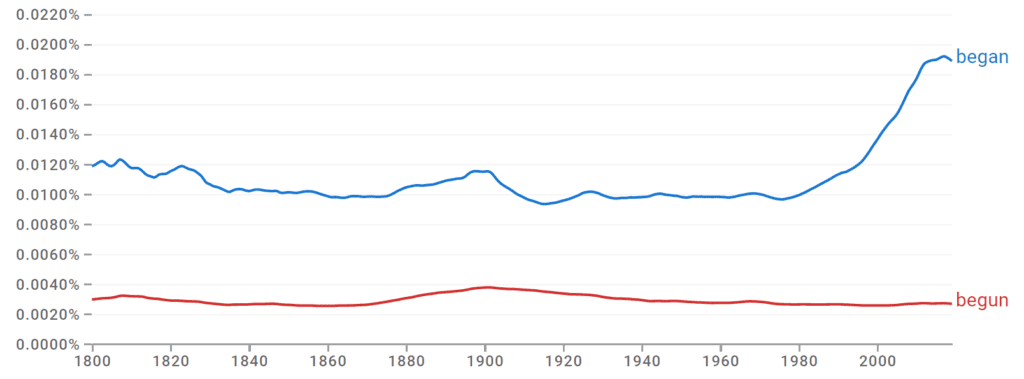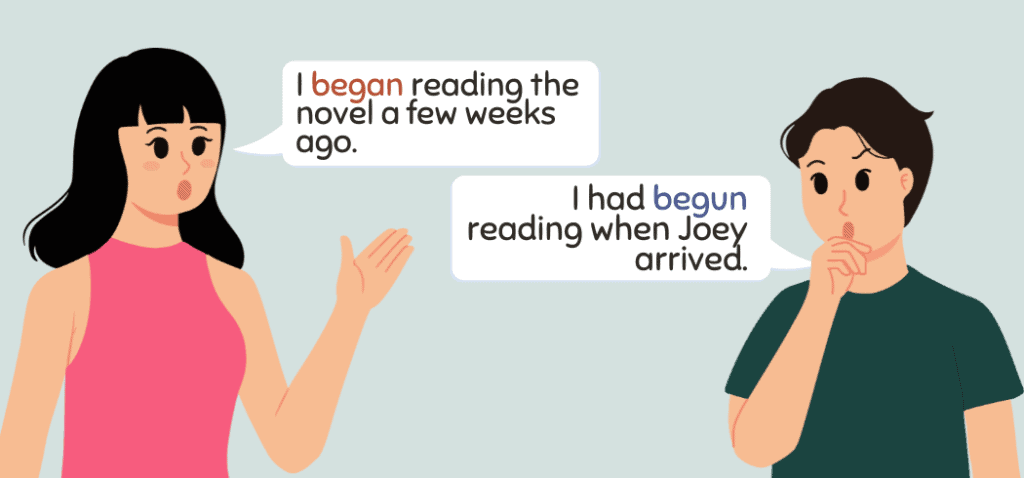Is it began or begun? That’s a good question and one I hear all the time. Both words are correct forms of the verb begin, which means their definition is the same. But they have a massive difference in terms of usage. Learn the difference between begun and began in this guide with writing tips.
Begun vs. Began
Both began and begun are correct. No word is incorrectly spelled. However, their usage differs.
Both begun and began are the past tense forms of an irregular action verb begin. An irregular verb is a verb that does not follow the typical pattern of its past form. That means it does not end in -d or -ed, as in begined.
Begin means to start, undergo, or perform.
- Began is a simple past tense of begin. It does not need a helping verb.
Example: I began drinking coffee at 7 AM.
- Begun is the past participle of begin. We use it with helping verbs like have, has, or had to form perfect tenses. Sometimes, we use it as an adjective for modifying a noun or pronoun.
Example: We’ve only just begun eating dinner.

Do not use began in perfect tenses. For example:
- Incorrect: We had began eating when Joey arrived.
- Correct: We had begun eating when Joey arrived.
Do not use begun in the simple past tense. For example:
- Incorrect: She begun watching TV ten minutes ago.
- Correct: She began watching TV ten minutes ago.
Using Began in a Sentence
- I began reading the novel a few weeks ago.
- The crowd began to clap after the band’s memorable performance.
- It began to rain the minute the event ended.
- Excerpts of residents’ panicked conversation began to circulate on social media, along with videos of the emergency response. They showed fire crews struggling to get around barriers to approach the building. (Wall Street Journal)
- A World Cup that began in controversy and uncertainty will end with history being made, though exactly what kind of history remains to be seen. Perennial favorites Germany, Belgium, England, Spain, and now Brazil are out. Morocco, France, Croatia, and Argentina remain. (LA Times)
Using Begun in a Sentence
- I will have begun law school after graduating with my first degree.
- The game had already begun by the time we found our seats in the arena.
- We have begun searching for the lost puppy.
- A probe into the firefighting operation linked to the death of a full-time Singapore Civil Defence Force (SCDF) national serviceman has begun and the findings will be made public in time. (Strait Times)
- WNBA star Brittney Griner has begun serving her nine-year sentence for drug possession at a Russian penal colony, her lawyers and agent said Thursday. (AP News)
How to Remember the Difference

It can be challenging to remember the differences between began and begun.
But just remember: Began is in past tense and requires no helping verb, while begun is in past participle form with a helping verb.
Is Began Past Tense?
Yes, began is the past tense of begin. For example:
- We began planning the project yesterday.
Is It Has Begun or Has Began?
The correct verb phrase is has begun. It’s the present perfect form of begin if the subject is singular. The present perfect tense is formed using has or have plus the past participle form of a verb. For example:
- The teacher has begun checking our assignments.
Final Word on Began or Begun
Began and begun are not alternative spellings of each other so don’t fall prey to common mistakes like this in your writing. To know which word you should use, remember:
- Began is the simple past conjugation.
- Began is the past participle form that is used with a helping verb.

Comments are closed.